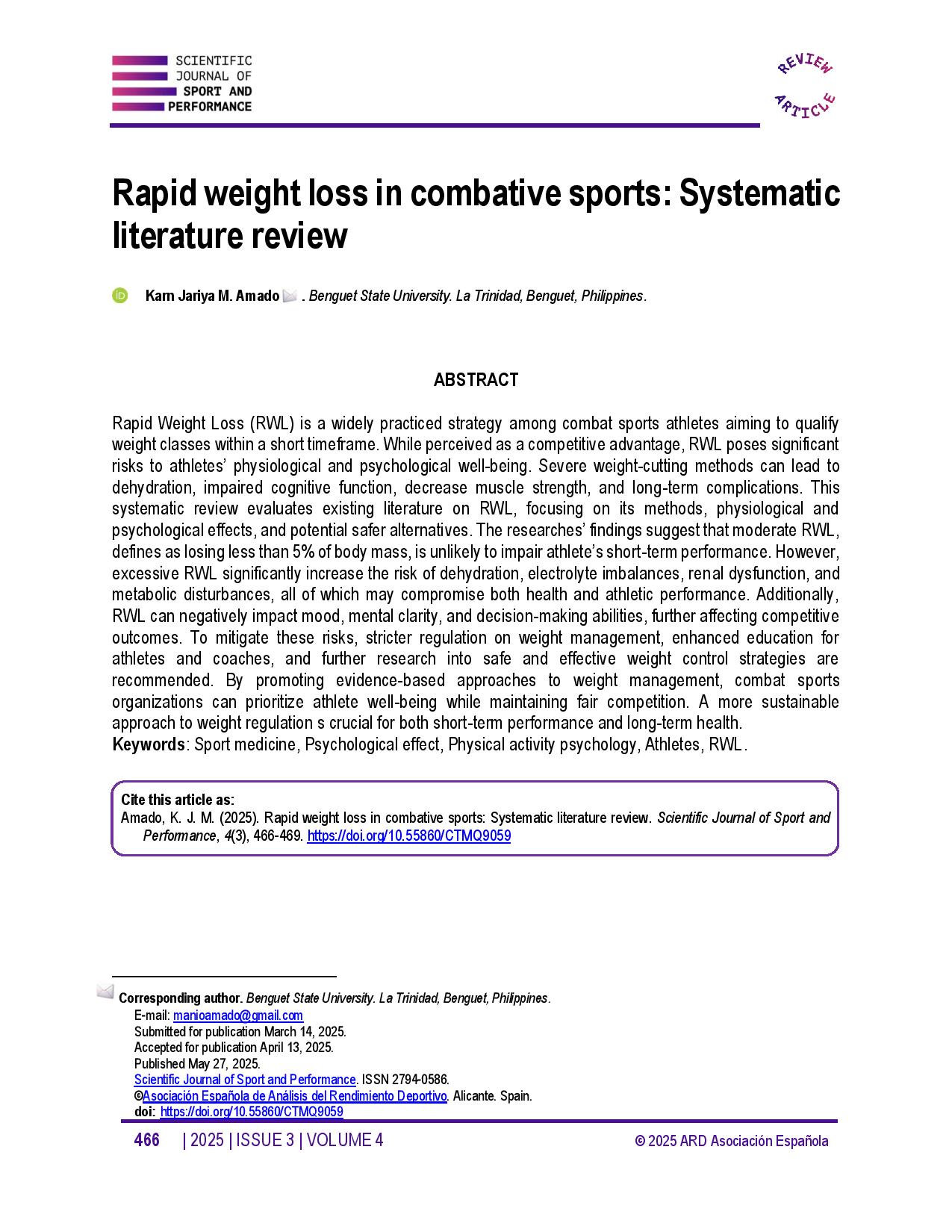Rapid weight loss in combative sports Systematic literature review
Main Article Content
Abstract
Rapid Weight Loss (RWL) is a widely practiced strategy among combat sports athletes aiming to qualify weight classes within a short timeframe. While perceived as a competitive advantage, RWL poses significant risks to athletes’ physiological and psychological well-being. Severe weight-cutting methods can lead to dehydration, impaired cognitive function, decrease muscle strength, and long-term complications. This systematic review evaluates existing literature on RWL, focusing on its methods, physiological and psychological effects, and potential safer alternatives. The researches’ findings suggest that moderate RWL, defines as losing less than 5% of body mass, is unlikely to impair athlete’s short-term performance. However, excessive RWL significantly increase the risk of dehydration, electrolyte imbalances, renal dysfunction, and metabolic disturbances, all of which may compromise both health and athletic performance. Additionally, RWL can negatively impact mood, mental clarity, and decision-making abilities, further affecting competitive outcomes. To mitigate these risks, stricter regulation on weight management, enhanced education for athletes and coaches, and further research into safe and effective weight control strategies are recommended. By promoting evidence-based approaches to weight management, combat sports organizations can prioritize athlete well-being while maintaining fair competition. A more sustainable approach to weight regulation s crucial for both short-term performance and long-term health.
Article Details

This work is licensed under a Creative Commons Attribution-NonCommercial-ShareAlike 4.0 International License.
References
Barley, O. R., Chapman, D. W., & Abbiss, C. R. (2019). The current state of weight cutting in combat sports. Sports, 7(5), 123. https://doi.org/10.3390/sports7050123 DOI: https://doi.org/10.3390/sports7050123
Connor, J., & Egan, B. (2019). Prevalence, magnitude, and methods of rapid weight loss in Irish MMA athletes. Sports, 7(9), 206. https://doi.org/10.3390/sports7090206 DOI: https://doi.org/10.3390/sports7090206
Fernández-Elías, V. E., et al. (2014). Validity of hydration non-invasive indices during the weight-cutting and official weigh-in for Olympic combat sports. PLoS One, 9(4), e95336. https://doi.org/10.1371/journal.pone.0095336 DOI: https://doi.org/10.1371/journal.pone.0095336
Janiszewska, K., & Przybyłowicz, K. E. (2020). Pre-competition weight loss models in taekwondo: Identification, characteristics, and risk of dehydration. Nutrients, 12(9), 2793. https://doi.org/10.3390/nu12092793 DOI: https://doi.org/10.3390/nu12092793
Maksimovic, N., et al. (2024). Prevalence of metabolic syndrome and its association with rapid weight loss among former elite combat sports athletes in Serbia. BMC Public Health, 24, 245. https://doi.org/10.1186/s12889-024-17763-z DOI: https://doi.org/10.1186/s12889-024-17763-z
Mauricio, C. D. A., et al. (2022). Rapid weight loss of up to five percent of body mass in less than 7 days does not affect physical performance in official Olympic combat athletes. Frontiers in Physiology, 13, 830229. https://doi.org/10.3389/fphys.2022.830229 DOI: https://doi.org/10.3389/fphys.2022.830229
Ranisavljev, M., et al. (2022). Rapid weight loss practices in grapplers competing in combat sports. Frontiers in Physiology, 13, 842992. https://doi.org/10.3389/fphys.2022.842992 DOI: https://doi.org/10.3389/fphys.2022.842992
Trivic, T., et al. (2023). Rapid weight loss can increase the risk of acute kidney injury in wrestlers. BMJ Open Sport & Exercise Medicine, 9, e001617. https://doi.org/10.1136/bmjsem-2023-001617 DOI: https://doi.org/10.1136/bmjsem-2023-001617




